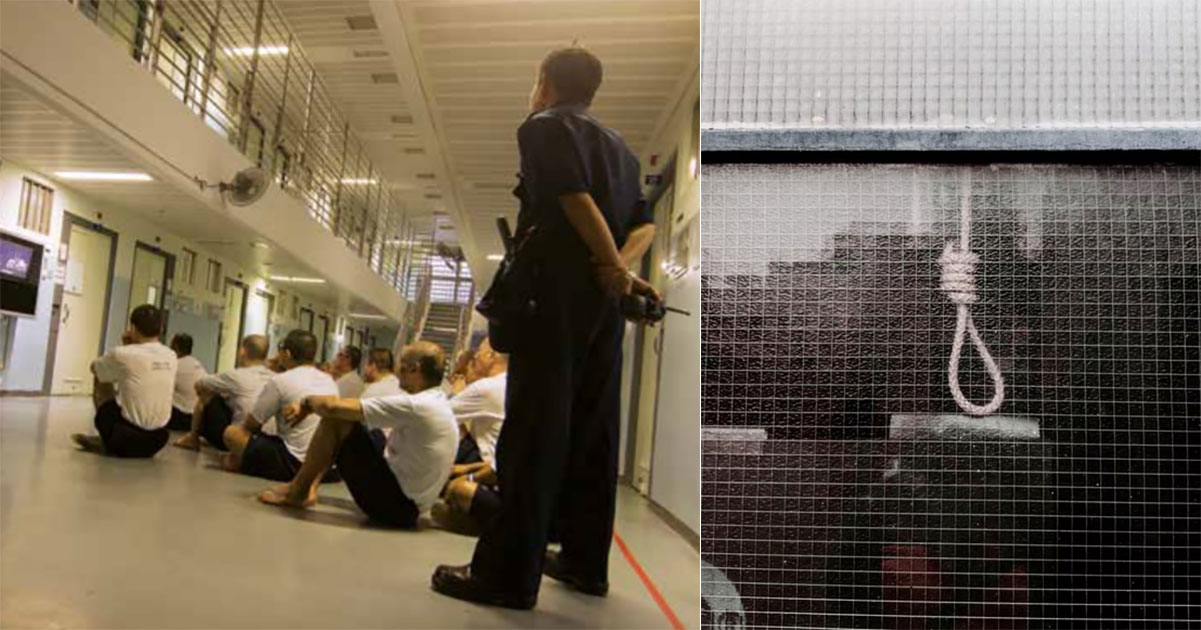Follow us on Telegram for the latest updates: https://t.me/mothershipsg
Three studies commissioned by the Ministry of Home Affairs (MHA) on the death penalty have shown that the majority of Singaporeans support its usage for "the most serious crimes" such as trafficking a significant amount of drugs, intentional murder and the use of firearms.
In addition, the studies also found that the majority of Singaporean citizens and Permanent Residents (PRs) agree the death penalty is effective in deterring these serious crimes.
According to MHA in a press release, the three studies are:
- A study on attitudes towards the use of capital punishment, commissioned by MHA in 2019 and conducted by the Institute of Policy Studies (IPS 2020),
- A survey on the attitudes of Singapore residents towards the death penalty conducted by the MHA Research and Statistics Division in 2021 (RSD 2021), and
- The perception of residents in regional cities on Singapore’s crime situation, law and safety, commissioned by the MHA Home Team Behavioural Sciences Centre and conducted in two phases in 2018 and 2021 respectively (HTBSC 2021).
Nearly three-quarters of respondents support the death penalty for the most serious crimes
IPS 2020 study
The IPS 2020 study found that 74 per cent of 2,000 Singapore residents and PRs agreed or strongly agreed with the use of the death penalty for the most serious of crimes.
58.6 per cent of the respondents were also in favour of retaining the death penalty in Singapore, while 53.7 per cent of them supported the death penalty in general.
Meanwhile, 22.9 per cent expressed that they do not approve of death penalty in all instances.
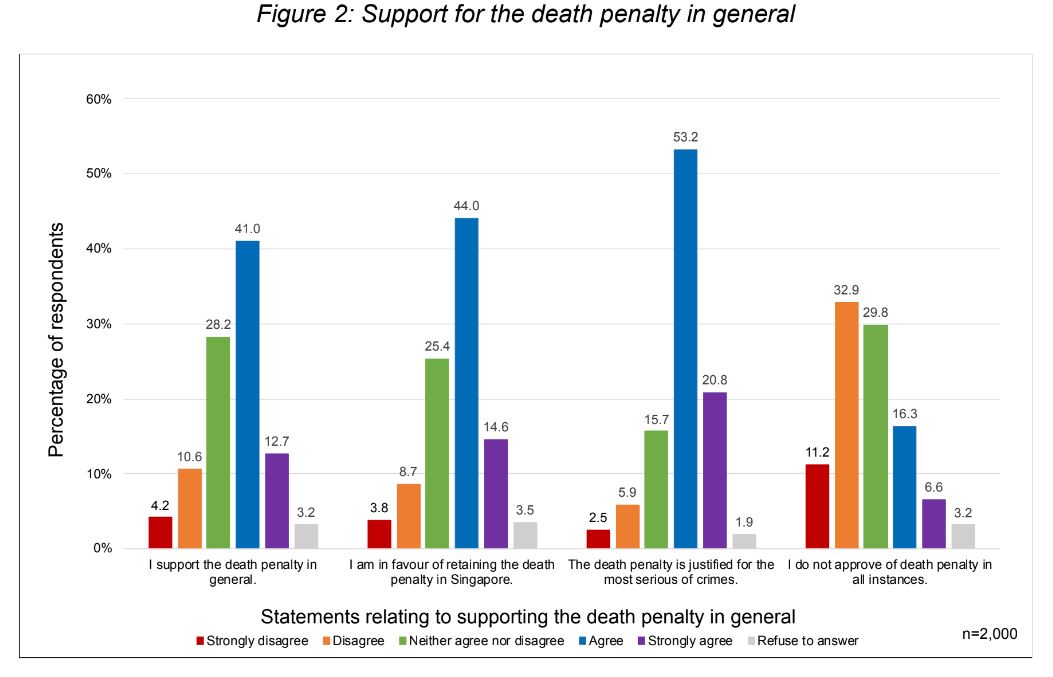 Source: Screenshot via IPS
Source: Screenshot via IPS
As for specific crimes:
- 71.4 per cent of respondents agreed or strongly agreed that the death penalty should be mandatory for intentional murder,
- 61.5 per cent agreed in relation to intentionally trafficking a substantial amount of drugs, and
- 60.1 per cent agreed in relation to the use of firearms with the intention of causing injury.
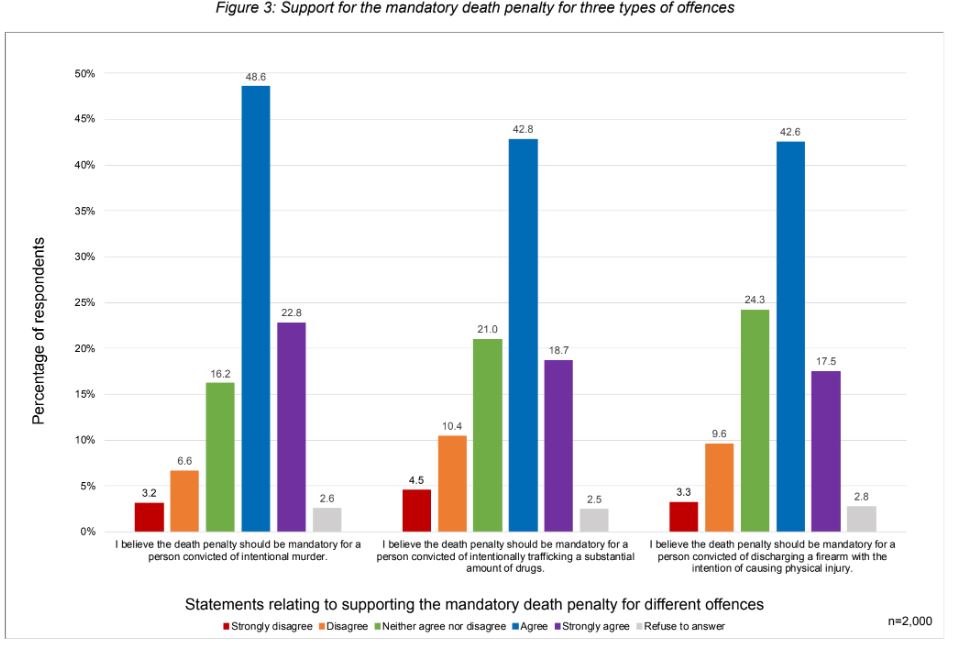 Source: Screenshot via IPS
Source: Screenshot via IPS
Data collection for this survey was carried out between October 2019 and January 2020, via a door-to-door household interview using the computer-assisted data collection (CAPI) system.
RSD 2021 study
As for RSD 2021, it found that 73.7 per cent of 2,000 Singapore citizens and PRs agreed that the death penalty should be used for the most serious crimes, while those who disagreed stood at 11.2 per cent.
 Source: Screenshot via MHA Research and Statistics Division
Source: Screenshot via MHA Research and Statistics Division
On the matter of specific crimes, RSD 2021 found that:
- 80.5 per cent of respondents agreed or strongly agreed that the mandatory death penalty was appropriate as the punishment for intentional murder,
- 71.1 per cent agreed or strongly agreed in relation to the use of firearms with the intent to cause injury, and
- 65.6 per cent agreed or strongly agreed in relation to trafficking a significant amount of drugs.
 Source: Screenshot via MHA Research and Statistics Division
Source: Screenshot via MHA Research and Statistics Division
MHA further noted that respondents who did not agree that the mandatory death penalty was appropriate for these three crimes were further asked whether the discretionary death penalty or life imprisonment would be more appropriate instead.
The ministry added that taking into account the respondents who said that they preferred the death penalty over life imprisonment, the RSD 2021 study found that a large majority of all respondents agreed that some form of death penalty – whether mandatory or discretionary – was appropriate as punishment for serious crimes at the following figures:
- 88.2 per cent for intentional murder,
- 82 per cent for use of firearms, and
- 73.4 per cent for trafficking a significant amount of drugs.
Large proportion of minority who disagreed with death penalty preferred rehabilitation
When the minority of 11.2 per cent in the RSD 2021 study was asked further about their reasons for disagreeing with the use of the death penalty for serious crimes, 43.9 per cent of them indicated that they preferred for offenders to be rehabilitated or given a second chance.
Another 23.6 per cent of this minority cited reasons that were pro-life.
A smaller group at 16.5 per cent believed that discretion was required in sentencing. This group is comprised of those who believe that the sentence should be decided case by case (6.3 per cent), the consideration of circumstantial factors (5.3 per cent) and the possibility of wrongful convictions (4.9 per cent).
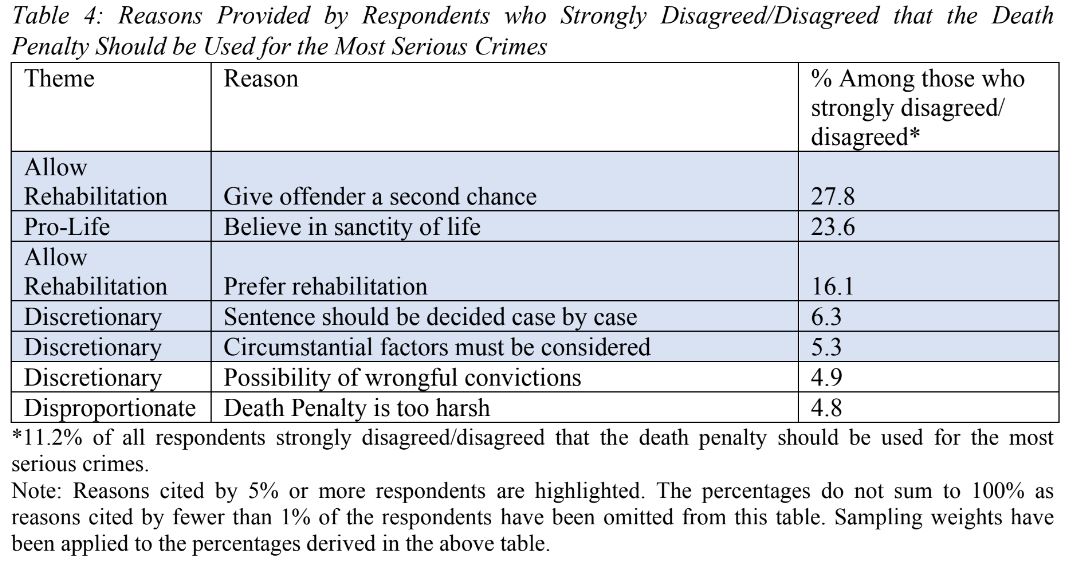 Source: Screenshot via MHA Research and Statistics Division
Source: Screenshot via MHA Research and Statistics Division
As for the 15.1 per cent who indicated that they were neutral, 36 per cent said that the sentence should be decided case-by-case and 23.7 per cent said circumstantial factors must be considered.
The study also noted that 14.9 per cent of the neutral respondents who cited reasons related to disproportionate punishment had felt that drug trafficking and firearm offences were less severe compared to murder.
Imposing the death penalty was therefore disproportionate to the severity of the crime for these respondents in particular.
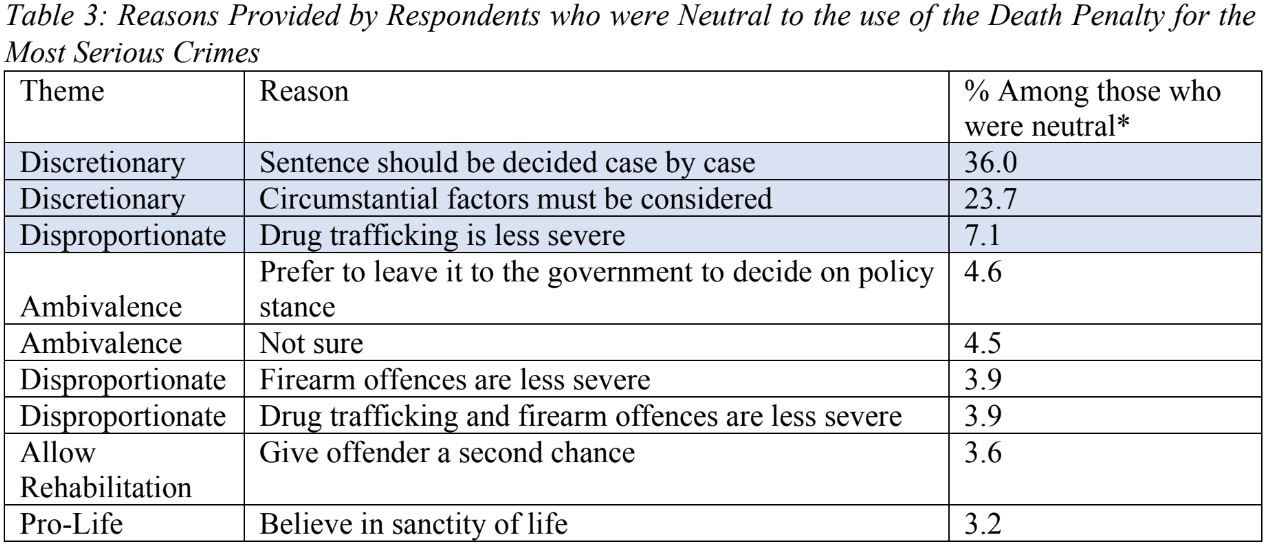
 Source: Screenshot via MHA Research and Statistics Division
Source: Screenshot via MHA Research and Statistics Division
Over 70 per cent agree across all three studies that the death penalty is effective in deterring serious crimes
All three studies also found that most Singapore citizens and PRs agree that the death penalty is effective in deterring serious crimes.
IPS 2020 study
The IPS 2020 study found that 78.2 per cent of respondents believe that the death penalty serves as a deterrent for serious crimes in general.
In relation to drug trafficking, 78.9 per cent believed that the death penalty deters people from trafficking substantial amounts of drugs into Singapore.
70.8 per cent of the respondents also believe that it is more effective than life imprisonment in doing so.
RSD 2021 study
In the case of the RSD 2021 study, 83.2 per cent of respondents agreed or strongly agreed that the death penalty in Singapore deters the trafficking of significant amounts of drugs, along with 85.9 per cent for both firearm offences and intentional murder.
For drug trafficking in particular, 73.7 per cent also agreed or strongly agreed that the death penalty is more effective than life imprisonment in deterring people.
This sentiment was also echoed by the foreign respondents in the HTBSC 2021 study, which was carried out among 7,221 respondents from six regional cities, through telephone interviews conducted with the assistance of survey companies engaged by MHA.
MHA added that 87.2 per cent of the regional residents from this study believed that the death penalty makes people not want to traffic substantial amounts of drugs into Singapore.
82.5 per cent of them also believed that the death penalty is more effective than life imprisonment in deterring people from trafficking drugs into Singapore.
High level of confidence in Singapore's criminal justice system
The ministry also highlighted how the RSD 2021 study revealed a "very high" level of confidence among respondents in Singapore’s criminal justice system.
88.5 per cent of respondents had confidence that accused persons in death penalty cases are subject to fair and rigorous investigations.
88.1 per cent also had confidence that accused persons in death penalty cases in Singapore undergo fair and rigorous trials.
In addition, 85.3 per cent believed that there were adequate safeguards to ensure that there were no wrongful executions.
MHA summed up the studies as such:
"Overall, the studies show that there is very strong support among Singapore residents on Singapore’s use of the death penalty for the most serious crimes, such as intentional murder, use of firearms, and trafficking in substantial amounts of drugs.
There is also a clear view, both domestically and within the region, that the death penalty is effective in deterring people from trafficking drugs into Singapore and is more effective than life imprisonment in doing so."
Top Photos via Singapore Prison Services & Unsplash
If you like what you read, follow us on Facebook, Instagram, Twitter and Telegram to get the latest updates.
